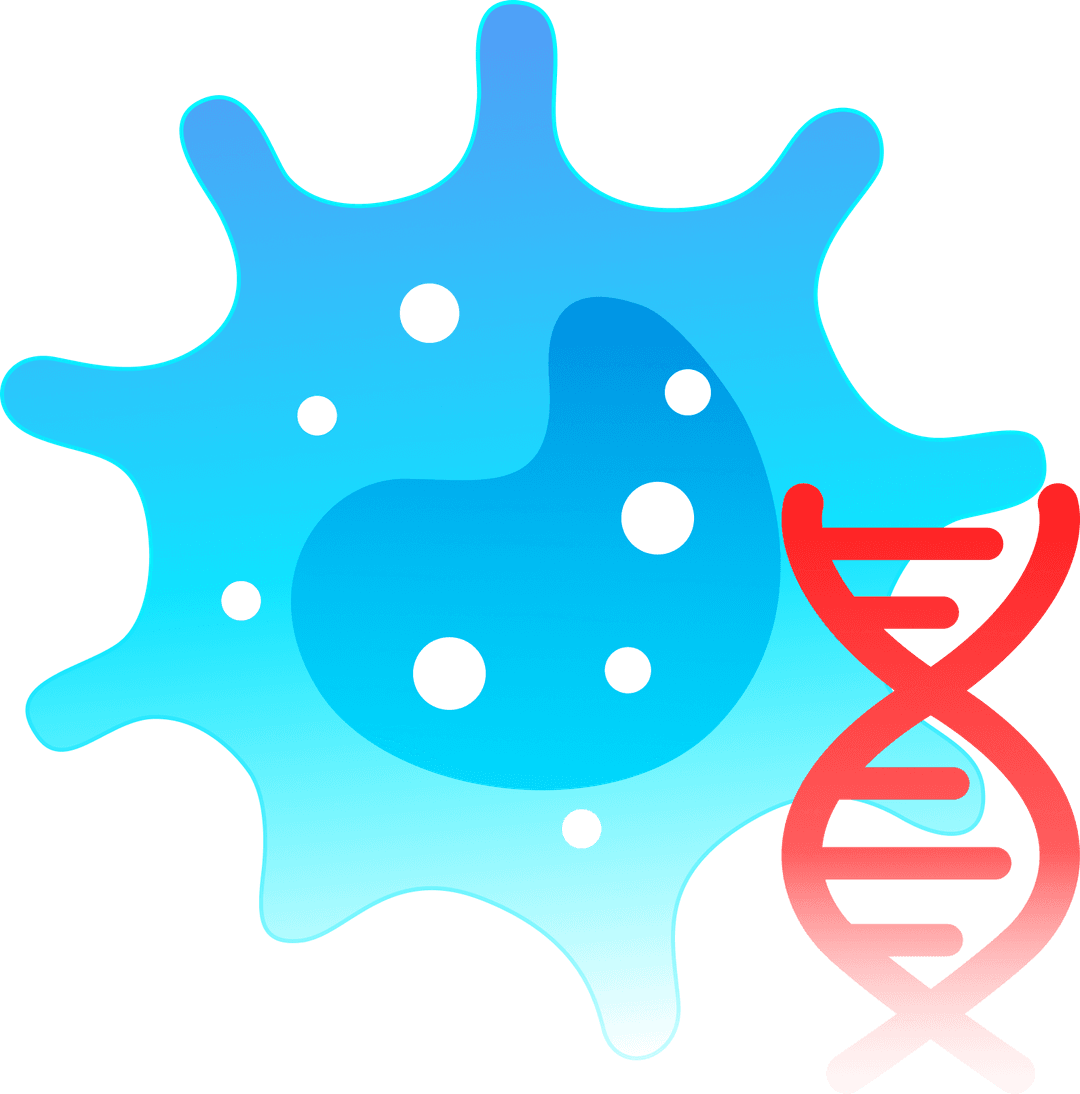Some cancers have early genetic markers.We decode them carefully
Heart disease is the no. 1 cause of death in India, striking younger and more quietly than ever before. But with advanced diagnostics
Why It’s Important?
The Stats You Can’t Ignore
CENT AI is built on clinical evidence and not assumptions. These genetic facts explain why early, accurate DNA analysis truly matters.
Around 5–10% of all cancers are caused by inherited genetic mutations in cancer predisposition genes (hereditary cancer syndromes)
Source: PMC
What all gets covered?
Comprehensive Genetic Screening for Cancer
We evaluates pathogenic variants in major hereditary cancer genes and includes polygenic risk scores for common cancer types to give a complete understanding of inherited and genome-wide cancer risk
Breast Cancer
Cancer that starts in the breast cells.
NGS
What We Test For
NGS identifies high-impact mutations in genes that raise hereditary breast cancer risk, while PRS measures your broader genome-wide susceptibility to breast cancer.
Key Genes Analyzed
ATM
BARD1
BRCA1
BRCA2
BRIP1
CDH1
CHEK2
MLH1
NBN
NF1
PALB2
PTEN
RAD51C
RAD51D
STK11
TP53
Blood Cancer
Cancers that affect the blood-making cells or immune cells
NGS
What We Test For
NGS identifies high-impact mutations in genes like CEBPA, GATA2 and RUNX1 that predispose to hereditary blood cancers, while PRS (where available) provides a broader genome-wide view of blood cancer susceptibility.
Key Genes Analyzed
CEBPA
GATA2
RUNX1
Colorectal Cancer
Cancer of the colon or rectum, usually starting from small polyps
NGS
What We Test For
NGS detects mutations in mismatch-repair and polyposis genes such as APC, MLH1, MSH2, MSH6, PMS2 and MUTYH, while PRS evaluates your overall inherited tendency for colorectal cancer and polyp formation.
Key Genes Analyzed
APC
BMPR1A
CDH1
CHEK2
EPCAM
MLH1
MSH2
MSH6
MUTYH
PMS2
PTEN
SMAD4
STK11
TP53
GREM1
POLD1
POLE
Endocrine Cancer
Cancer in hormone-producing glands, especially the thyroid
NGS
What We Test For
NGS screens for high-impact variants in endocrine-tumor genes such as MEN1, RET, CDKN2A and VHL, while PRS adds broader genome-wide insight into related endocrine and tumor pathways.
Key Genes Analyzed
AIP
CDC73
CDKN2A
MEN1
PTEN
RET
SDHA
SDHAF2
SDHB
SDHC
SDHD
SMAD4
TMEM127
TP53
VHL
Endometrial / Uterine Cancer
Cancer of the lining of the uterus, usually after abnormal bleeding
NGS
What We Test For
NGS identifies pathogenic variants in EPCAM, MLH1, MSH2, MSH6, PMS2, PTEN and STK11 associated with hereditary endometrial/uterine cancer, while PRS estimates broader genome-wide risk.
Key Genes Analyzed
EPCAM
MLH1
MSH2
MSH6
PMS2
PTEN
STK11
Ovarian Cancer
Inherited mutations that raise ovarian cancer risk
NGS
What We Test For
NGS identifies high-impact mutations in genes such as BRCA1, BRCA2, BRIP1, PALB2 and RAD51C/D that raise hereditary ovarian cancer risk, while PRS uses genome-wide markers to estimate broader susceptibility, often overlapping with breast-cancer risk.
Key Genes Analyzed
BRCA1
BRCA2
BRIP1
DICER1
EPCAM
MLH1
MSH2
MSH6
PALB2
PMS2
RAD51C
RAD51D
STK11
TP53
Pancreatic
Inherited mutations that raise pancreatic cancer risk.
NGS
What We Test For
NGS screens for pathogenic variants in genes such as BRCA2, CDKN2A, PALB2 and SMAD4 that predispose to hereditary pancreatic cancer, while PRS (where available) assesses broader genome-wide risk influences.
Key Genes Analyzed
ATM
APC
BRCA1
BRCA2
CDKN2A
EPCAM
MEN1
MLH1
MSH2
MSH6
PALB2
SMAD4
STK11
TP53
VHL
Prostate Cancer
A common male cancer starting in the prostate gland, often slow-growing
NGS
What We Test For
NGS screens for high-impact variants in genes like BRCA2, BRCA1, ATM, CHEK2 and HOXB13-related pathways (via panel genes) that increase hereditary prostate cancer risk, while PRS measures your broader genome-wide susceptibility to prostate cancer.
Key Genes Analyzed
ATM
BRCA1
BRCA2
MLH1NBN
MLH1
MSH2
MSH6
BRIP1
CHEK2
PMS2
PRKAR1A
SMAD4
SUFU
TP53
VHL
Kidney
Inherited mutations that raise kidney cancer risk.
NGS
What We Test For
NGS detects rare variants in genes such as VHL, BAP1, FH, FLCN and MET associated with hereditary kidney cancer syndromes, while PRS adds genome-wide context for renal cancer risk where data supports it.
Key Genes Analyzed
BAP1
FH
FLCN
MEN1
MLH1
MSH2
MSH6
NF2
PHOX2B
PMS2
PRKAR1A
PTEN
SUFU
TP53
VHL
Skin Cancer
Inherited mutations that raise melanoma and other skin cancer risk.
NGS
What We Test For
NGS evaluates high-impact mutations in genes like CDKN2A, CDK4 and DNA-repair genes, while PRS (where available) estimates broader genome-wide susceptibility to melanoma and other skin cancers.
Key Genes Analyzed
BAP1
BRCA2
CDK4
CDKN2A
ERCC2
ERCC3
ERCC4
ERCC5
PTEN
XPA
XPC
Stomach Cancer
Inherited mutations that raise stomach/gastric cancer risk.
NGS
What We Test For
NGS identifies mutations in genes such as CDH1, APC, BMPR1A, SMAD4 and STK11 associated with hereditary gastric and GI cancer syndromes, while PRS (where data exists) offers additional genome-wide assessment of gastric cancer susceptibility.
Key Genes Analyzed
APC
BMPR1A
CDH1
KIT
MLH1
MSH2
MSH6
PMS2
SDHA
SDHB
SDHC
SMAD4
STK11
FAQ
Frequently Asked Questions
This screening analyses your DNA across all four major disease systems—Heart, Cancer, Neuro, and Metabolic—using both Next-Generation Sequencing (NGS) for high-impact genes and Polygenic Risk Scoring (PRS) for common, multi-gene risks.
Since your DNA doesn’t change, genetics is typically a once-in-a-lifetime test.
But your personalised screening plan is updated as medical science evolves.
Yes. Genetics allows you to:
Detect risks decades before symptoms
Personalise screening (MRI frequency, calcium score, cancer surveillance, etc.)
Modify lifestyle based on your actual biology
Take early actions that can reduce risk by 30–70%, depending on the condition
Most consumer DNA tests only analyse a few markers or ancestry data.
CENT AI performs clinical-grade sequencing + PRS across thousands of markers and medically important genes—validated for preventive healthcare, not recreation.
